This independent research was undertaken by Moving to Spain and is reproduced here with permission.
Since the COVID-19 pandemic, remote working has become the norm. And despite things gradually returning to normal, more people are choosing to continue working from home.
One of the beauties of remote working is that you can work from anywhere in the world. This has provided people with the opportunity to move to another country without having to look for a new job. Whether you’re moving to Spain, Italy, or France, as long as you have a laptop and Wi-Fi, you can still get your work done whilst enjoying the scenery and culture of a new country.
That’s why we wanted to find out which countries are the best for remote workers to relocate. We’ve looked at several factors, including the cost of living, internet, visas, and more, to discover the best European country for remote workers.
The Best European Countries for Remote Workers
Relocating as a remote worker is an exciting opportunity but also a stressful decision. And there are so many factors to consider that it can be a bit of a headache. That’s why we wanted to make that decision easier by ranking the best European countries for remote workers.
Norway is the best country for remote workers to relocate to, with a score of 7.79/10
We’ve looked at internet speed, happiness, visas, cost of living, safety, healthcare, and remote worker prevalence to reveal the best countries for remote workers.
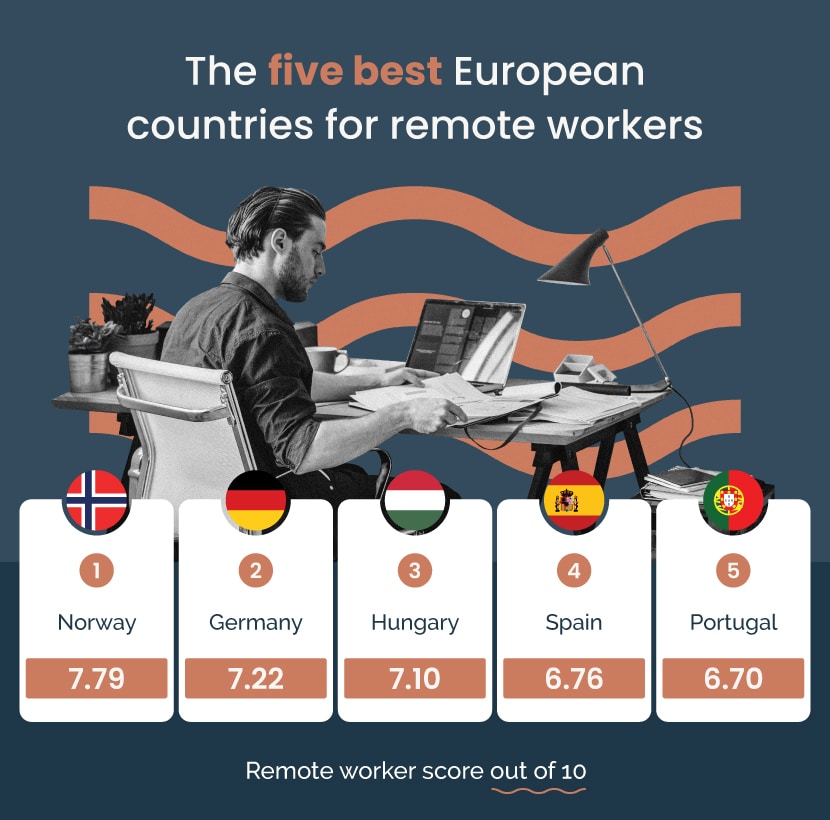
- Norway – 7.79 remote worker score
Norway takes the top spot with a remote worker score of 7.79 out of 10. Norway is one of the happiest countries in Europe. As well as offering the best quality of healthcare in Europe, Norway also has the highest percentage of remote workers. Norway is famed for its natural beauty, with its view of the northern lights, fjords, and wildlife. Whether it’s skiing, hiking, or kayaking, Norway will feed your appetite for sightseeing and adventure, ensuring you never want to leave.
- Germany – 7.22 remote worker score
With a remote worker score of 7.22 out of 10, Germany takes second place in our list of the best countries for remote workers. Germany is another happy country on our list, with good healthcare quality and a high number of remote workers. However, Germany’s internet speed is not the best. The cost of living is competitive, and you have a choice of some of Europe’s most exciting cities.
- Hungary – 7.10 remote worker score
The third best country to relocate to is Hungary, with a remote worker score of 7.10. Hungary boasts some of the best internet speeds in Europe, as well as a low cost of living, making it a great place to relocate to. Hungary is also one of the countries to offer a digital nomad visa which can save a lot of stress when planning your move. Hungary is rapidly becoming popular with remote workers and digital nomads due to low costs, security, and decent healthcare options..
- Spain – 6.76 remote worker score
Fourth place goes to Spain, with a remote worker score of 6.76 out of 10. Living in Spain can offer you some of the best internet speeds in Europe, and healthcare in Spain is among the best in Europe. Spain is another one of the countries that offer a digital nomad visa, in case you want to enjoy some of Europe’s best weather on a more long-term basis. Whether you’re living in Madrid or living in Barcelona, Spain is full of gorgeous architecture and golden beaches, a chance to enjoy the famous Spanish lifestyle.
- Portugal – 6.70 remote worker score
Our top five is completed by Spain’s neighbor, Portugal, with a remote worker score of 6.70 out of 10. Portugal scores consistently well across our categories. It’s one of the safest countries on our list, with good internet and a cheap cost of living. Portugal is known for its fantastic weather, with over 300 days of sunshine each year. It’s also well known for the warm welcome to Expats living in Portugal.
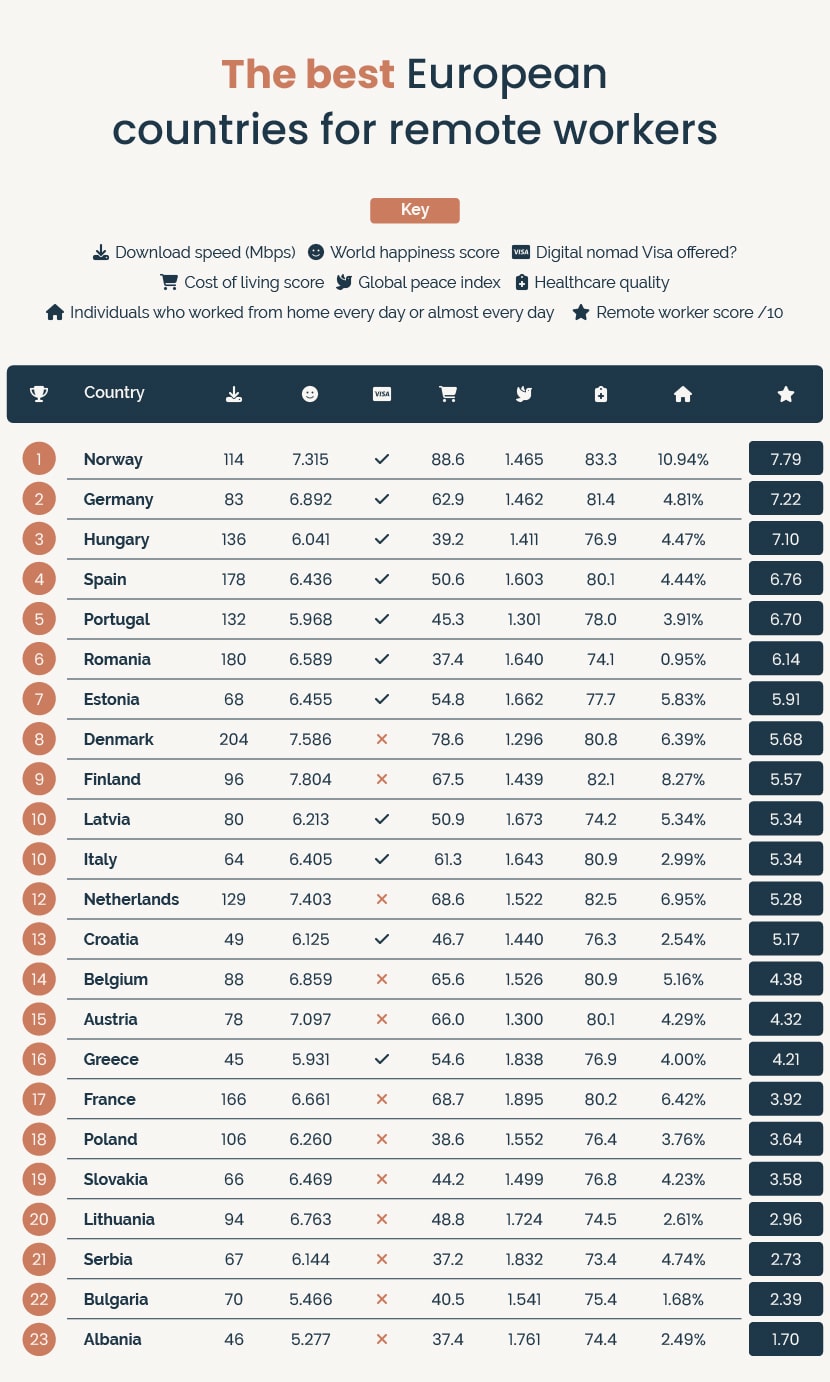
Denmark has the fastest internet, with a download speed of 204 Mbps
For remote workers, there’s nothing worse than lag and dropouts. Whether it’s researching or hopping onto meetings, slow internet speed can be one of the most frustrating things. That’s why we found the European countries with the fastest download speeds.
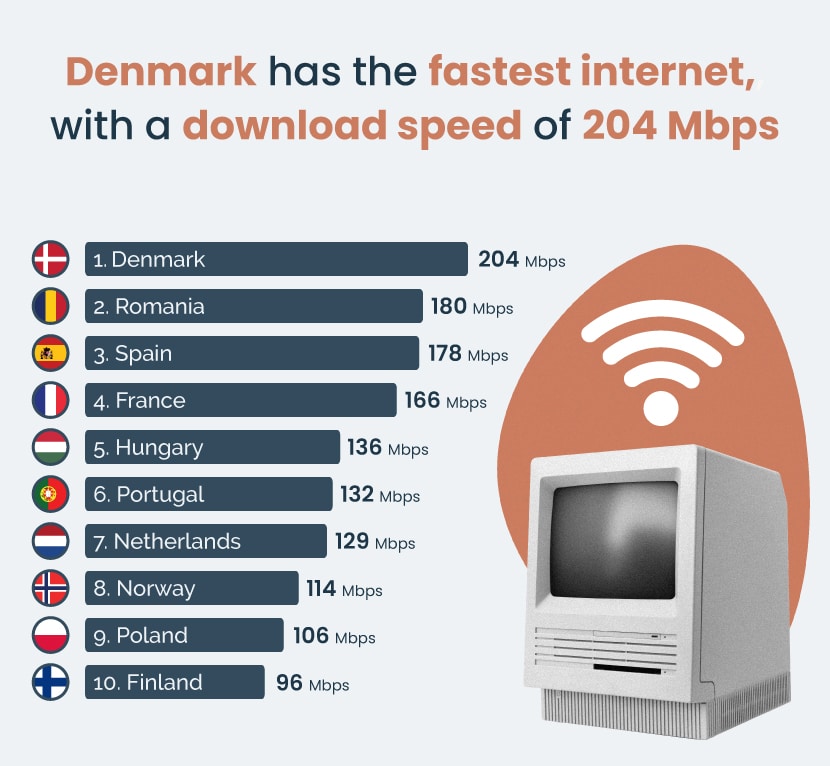
- Denmark – 204 Mbps download speed
The country with the best Internet is Denmark, with a download speed of 204 Mbps. Denmark is a vibrant country with some phenomenal natural beauty. And sharing its beauty with your Instagram followers couldn’t be easier with its internet speed. Its capital, Copenhagen, is also an eco-friendly city, with bikes outnumbering cars by five to one.
- Romania – 180 Mbps download speed
Romania comes in second with a download speed of 180 Mbps. Romania is a gorgeous country with plenty of natural wonders, landscapes, and UNESCO World Heritage Sites. Romania is also home to the heaviest building in the world. Bucharest’s Palace of Parliament is made of 700,000 tonnes of steel and bronze.
- Spain – 178 Mbps download speed
Spain completes our top three with a download speed of 178 Mbps. As a remote worker in Spain, this is a significant plus. Internet speed is crucial to a day’s work, and with Spain’s digital nomad visa, you can easily join the 94% of residents who are connected to the internet.
More than 10% of Norway’s population works from home every day, the highest in Europe
4.44% of Spain’s population works from home, which is slightly below the European average of 4.78%. We found out the countries in Europe that are bringing that average up.
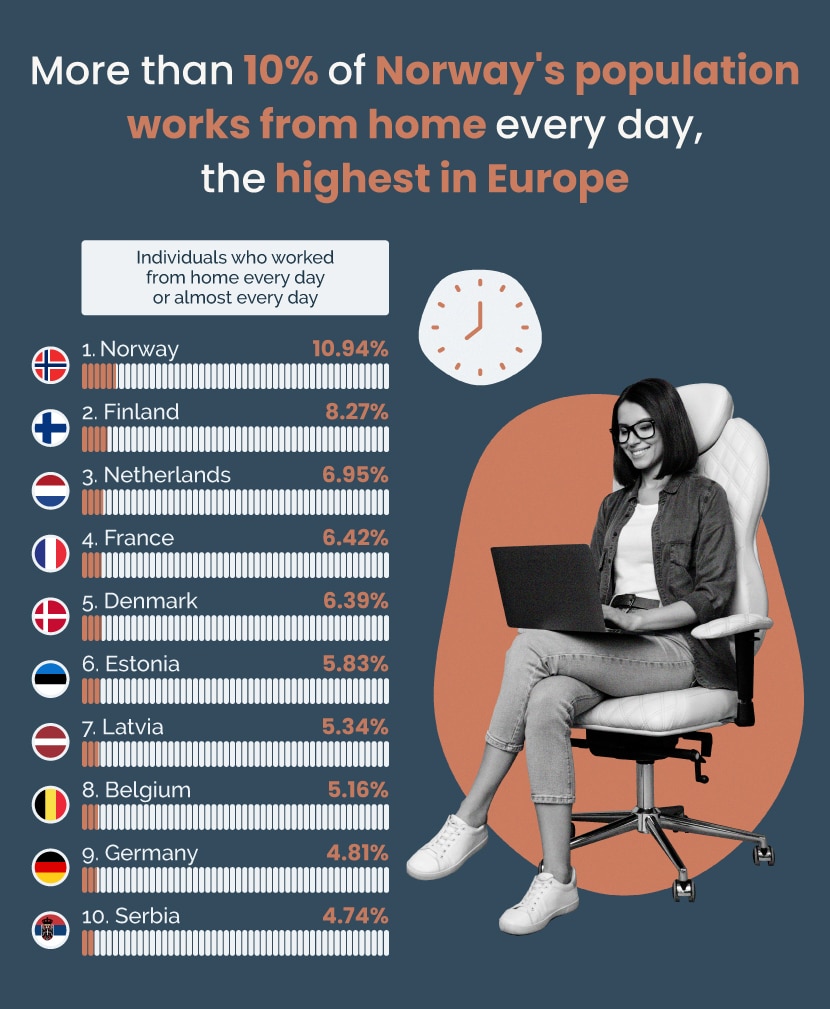
- Norway – 10.94% of the population works from home.
The European country with the most remote workers is Norway, with almost 11% of its population working from home every day. This is almost three times higher than Spain’s percentage of under 4.5%. Norway also has excellent internet speed, ranking in the top 10 for this factor.
- Finland – 8.27% of the population work from home.
Finland takes second place with 8.27% of its population working from home every day or almost every day, just under double Spain’s percentage. Finland’s internet speed isn’t the best, with a download speed of 96 Mbps. However, it is the happiest country not just in Europe but the world and has been for the last six consecutive years.
- Netherlands – 6.95% of the population works from home.
Completing our top three is the Netherlands, with 6.95% of its population working from home every day or almost every day. The Netherlands’ total is around 2.5% higher than Spain’s percentage; however, the Dutch rank 12th overall. Despite their high cost of living, the Netherlands is a happy country with good internet speed and healthcare quality.
The Cheapest Place To Live In Europe Is Serbia, with a cost of living score of 37.2
The cost of living is an important factor when deciding where to relocate to. And having more disposable income can really improve your quality of life. Spain just ranks outside of the top 10 cheapest countries to live in, with a score of 50.6. However, this is below the average in our list, which sits at 55.3.
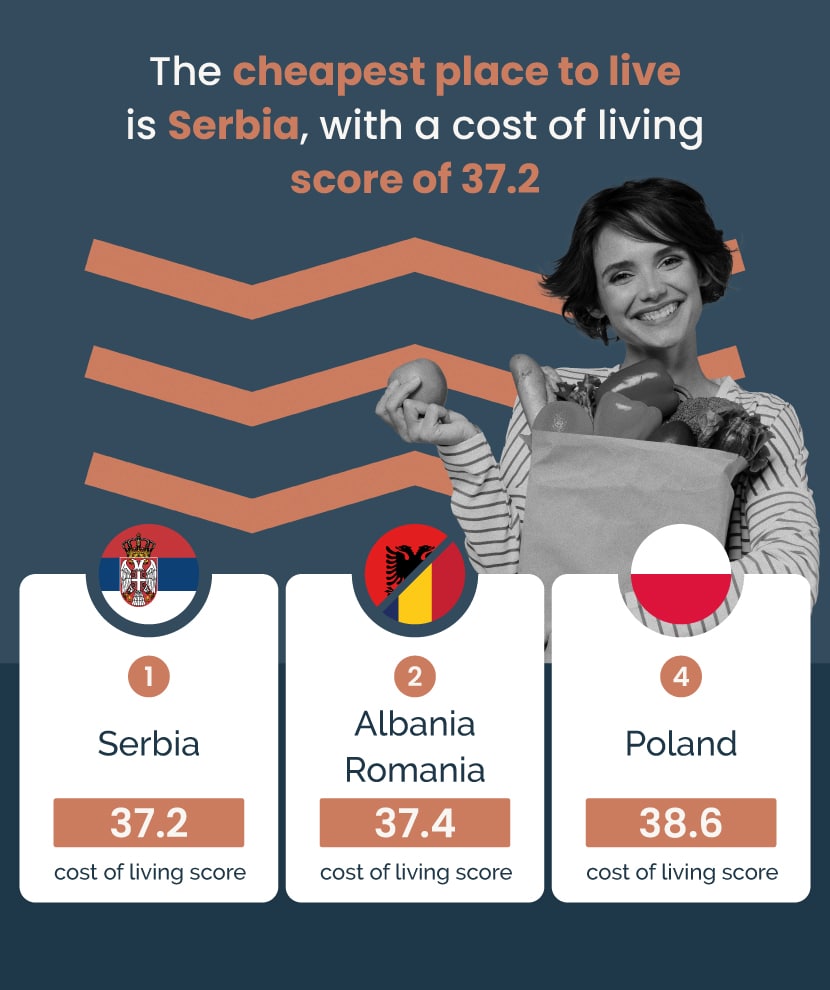
- Serbia – 37.2 cost of living score
The cheapest European country to live in is Serbia, with a cost of living score of 37.2. One of the reasons Serbia is so cheap is due to the lack of tourism. Despite its natural beauty, tourism is still yet to boom, which can make it a great place to relocate to if you’re looking for somewhere more relaxing. It’s also a very friendly country!
- Albania/Romania – 37.4 cost of living score
Albania and Romania share second place, with a cost of living score of 37.4. A great way to unwind after a hard day is by going out for a nice meal. A mid-range restaurant is cheaper in Albania; however, both countries sit around the €30 mark. Groceries are around the same; however, the cost of basic utilities is more expensive in Romania.
- Poland – 38.6 cost of living score
Poland completes our top three with a cost of living score of 38.6, just 14 points lower than Spain. The cost of living is generally cheap as Poland’s economy is still developing. Compared to Spain, groceries are generally cheaper, other than eggs and tomatoes, which on average are 20c cheaper.
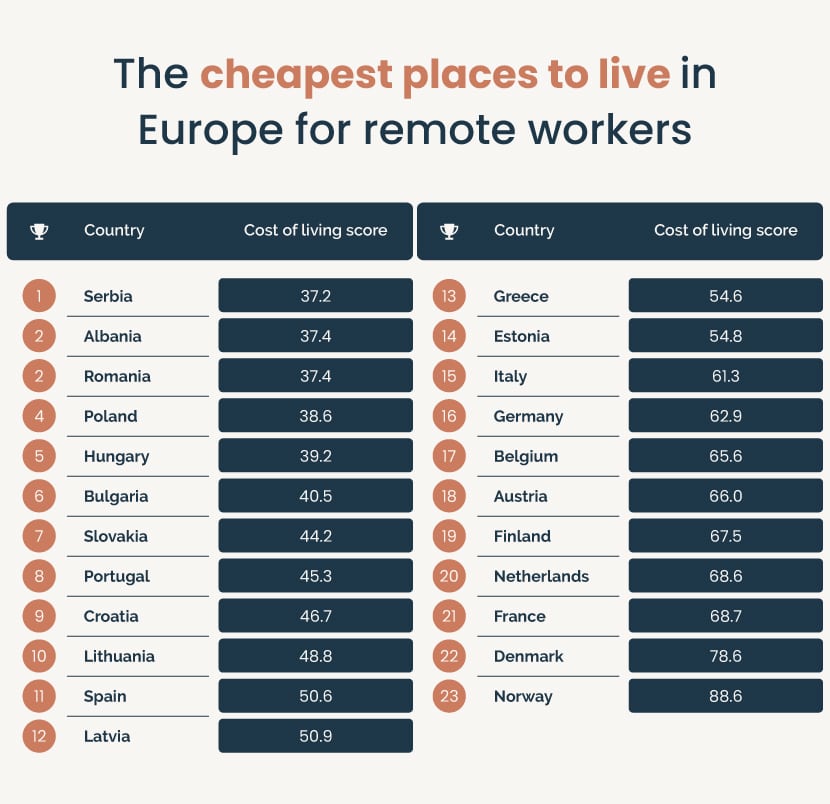
What European Countries Offer A Digital Nomad or Remote Work Visa?
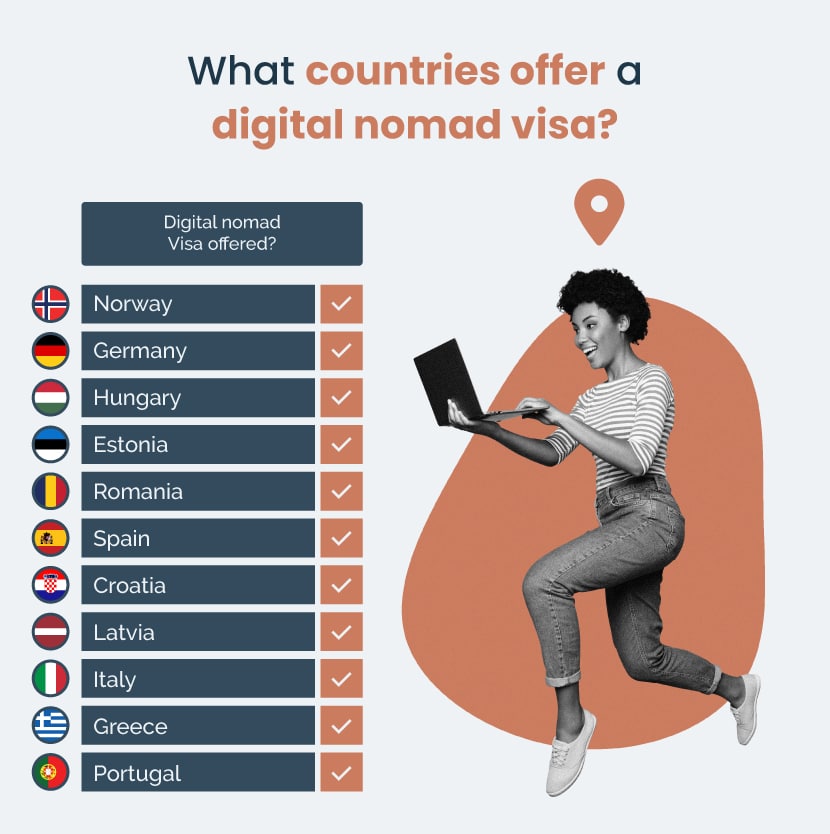
A digital nomad visa allows you to work remotely in a foreign country. Usually, to qualify for this visa, you have to work for an employer or have a business you can manage outside of your host country.
Across the world, there are a total of 42 countries that offer a digital nomad visa, 15 of which are in Europe. To be eligible for a digital nomad visa, you need to be over 18 years of age, have a specific monthly income, and be able to work from anywhere in the world. German, Italian, and Spanish digital nomad visas are among those that are available.
Why is Spain the 4th best country to relocate to?
Our research ranked Spain as the fourth best country for remote workers to relocate to in Europe. But why did the country rank so highly?
In our overall list, Spain was ranked as the fourth best European country to relocate to. With one of the fastest internet speeds in Europe, Spain is suited to remote working, and that’s without mentioning the weather. The east coast of Spain overlooks the Mediterranean Sea, making it one of the hottest countries in Europe. It’s warm weather and sunny skies will brighten those Monday blues. The cost of living in Spain is also on the cheaper side. While it’s not the cheapest, it’s below the average from our list and is cheaper than the likes of Germany, France, and the Netherlands. Of course, what makes Spain a great choice is their digital nomad visa, which can save an awful lot of time and stress when choosing to relocate. Because of this, we wanted to find out the best cities in Spain for remote workers as well…
The best cities in Spain for Remote Workers?
We also wanted to find out where in Spain is best for remote workers to relocate to. We’ve compared some of the most popular choices to see which Spanish city comes out on top.
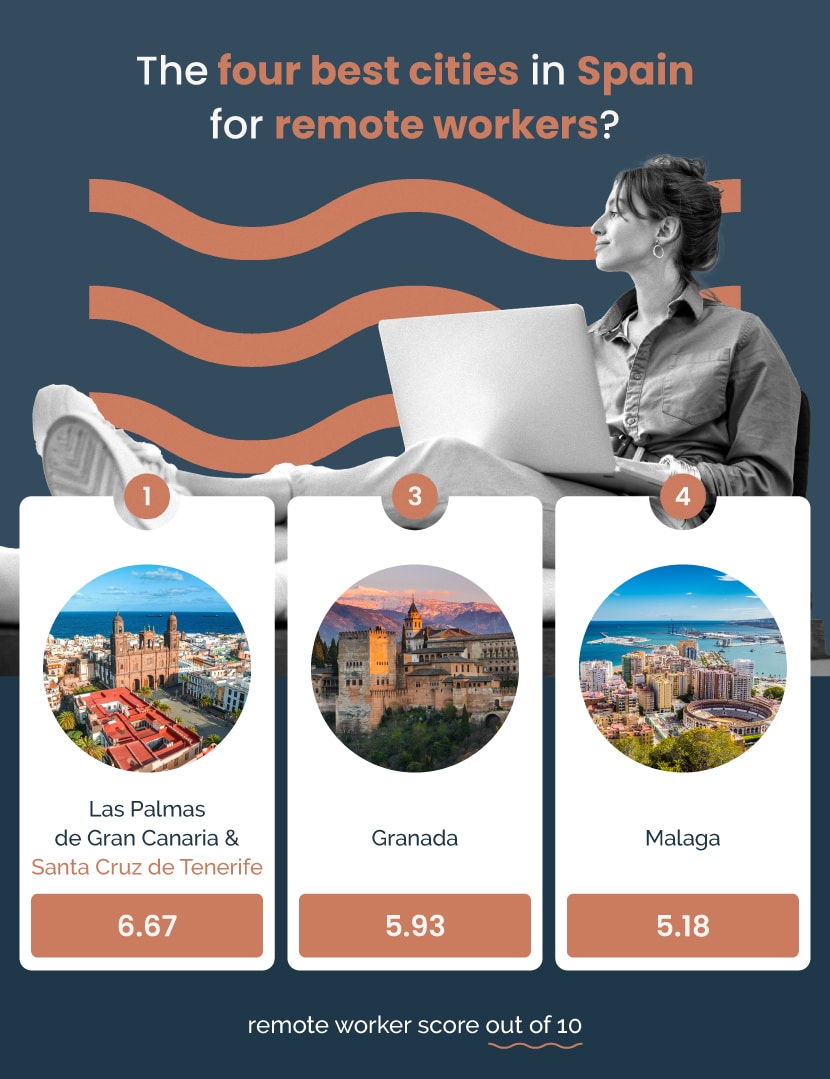
- Las Palmas de Gran Canaria/Santa Cruz de Tenerife – 6.67 remote worker score
The best Spanish city for remote workers is tied between Las Palmas de Gran Canaria and Tenerife, both with a remote worker score of 6.67 out of 10. These are two of the seven islands which make up the Canarian archipelago, more commonly known as the Canary Islands, and the two winners are in separate provinces. Gran Canaria is the more well-rounded of the two; however, both are let down by one category. Tenerife is the safest and cheapest place to live but it also has the worst wifi. Whereas, Gran Canaria is the second-cheapest with the second-fastest wifi, but with the third-lowest safety score.
- Granada – 5.93 remote worker score
Granada takes second place with a remote worker score of 5.93 out of 10. Located in the south of Spain, Granada is an excellent place for remote workers. Although it’s not the safest, it’s cheap with good internet making it a well-balanced option. Granada is home to one of the most famous monuments of Islamic architecture, the Alhambra, which is also one of the most visited tourist sites in Spain.
- Malaga – 5.18 remote worker score
Sticking to the south of Spain, Malaga completes our top three with a remote worker score of 5.18 out of 10. Malaga might not have the best wifi; however, its cost of living is reasonably low. The main reason for Malaga placing so high on our list is its safety score, where it ranks as the third safest city in Spain.
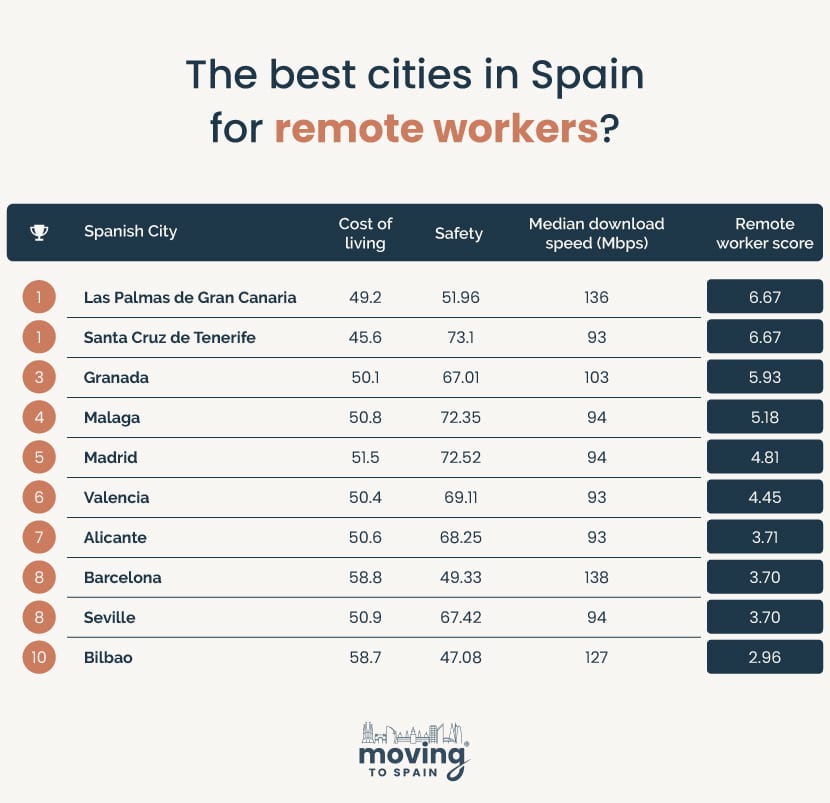
Methodology
We looked at every country in Europe, removing Russia and Ukraine, as well as any countries with missing data. If a country is missing from the data, this means that data was not available for every factor.
- We used Speedtest to find the download speeds for different countries.
- We used Numbeo for the cost of living scores.
- We used the Economics and Peace for the Global Peace Index scores.
- We used the World Happiness Report to find the happiness scores for each country.
- We used Eurostat to find the percentage of the population that works from home every day or almost every day.
- We used The Legatum Prosperity Index to find the healthcare quality. We took the figures from 2022 for this factor and not the averages over the years.
- Finally, we used Where Can I Live to find the countries with digital nomad or remote worker visas. When calculating the overall score, yes = 1 and no = 0.
- We then normalized these factors giving each factor a score out of 10. We then averaged our normalized scores to get our overall remote worker score. We doubled the weighting for the countries that offer a digital nomad visa due to the importance of this factor.
- We repeated this process to compare Spanish cities, using Numbeo once again for the cost of living and safety scores. We then used Fair Internet Report to find the internet speeds.








